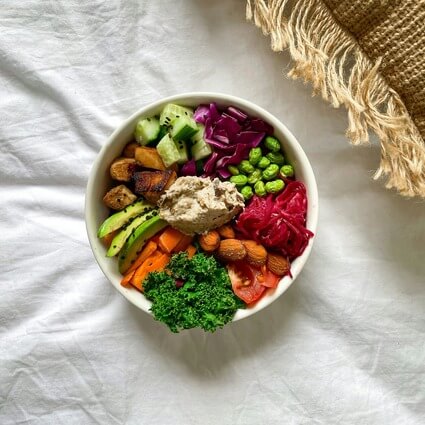 When most people hear the word “protein,” they immediately think of meat, eggs, or other animal-based foods. But protein is so much more than just what’s on your plate. It’s a crucial macronutrient that plays a vital role in nearly every system of your body—from repairing tissues to building muscles and supporting your immune system.
When most people hear the word “protein,” they immediately think of meat, eggs, or other animal-based foods. But protein is so much more than just what’s on your plate. It’s a crucial macronutrient that plays a vital role in nearly every system of your body—from repairing tissues to building muscles and supporting your immune system.
Why Protein Matters
Protein is one of the three main macronutrients (alongside fats and carbohydrates) and serves as the foundation of your body’s structure and function.
1. Building and Repairing Tissues
Protein is the primary building block of:
- Muscles
- Bones
- Cartilage
- Skin
- Blood vessels
It also plays a key role in repairing damaged tissues and supporting the growth of new cells—critical for injury recovery and healing after chiropractic adjustments or physical therapy.
2. Immune System Support
Proteins help form antibodies, which are essential for defending the body against infections. A strong immune response is deeply connected to your body’s protein intake.
3. Energy and Oxygen Transport
In the absence of adequate fats or carbohydrates, your body can use protein for energy. Protein also contributes to oxygen delivery by forming part of hemoglobin in red blood cells.
4. Growth and Development
Protein is vital during periods of growth—especially for children, teenagers, and pregnant individuals. It also helps with bone density and tissue development.
5. Weight Management
Protein helps keep you full longer. It supports metabolism by preserving lean muscle mass during weight loss, which can enhance fat burning.
6. pH and Fluid Balance
Protein helps regulate body pH and maintain proper fluid levels. This is important for muscle recovery, digestion, and homeostasis.
7. Nutrient Transport
Proteins serve as carriers for nutrients—getting vital elements like iron and oxygen where they need to go. They also store nutrients for future use.
Protein’s Role in Hormones and Enzymes
Proteins aren’t just structural—they’re also functional.
Hormones
Many hormones are protein-based, acting as chemical messengers between organs and tissues. These include:
- Insulin – controls blood sugar
- Glucagon – regulates stored sugar release
- hGH (human growth hormone) – promotes tissue growth
- ADH – regulates water retention in the kidneys
- ACTH – stimulates cortisol production
Hormones are grouped into:
- Protein and peptide hormones (chains of amino acids)
- Steroid hormones (fat-based, like testosterone)
- Amine hormones (made from amino acids like tyrosine)
Enzymes
Enzymes are proteins that speed up chemical reactions. They’re involved in:
- Digestion (e.g., lactase, sucrase)
- Energy production
- Muscle contraction
- Blood clotting
Many enzymes require vitamins or minerals to function properly.
The Power of Plant-Based Protein
Plant-based protein is an excellent choice for many, offering a range of health benefits beyond just meeting protein needs.
Benefits of Plant-Based Protein
- Rich in Fiber: Promotes digestive health and regulates blood sugar.
- Reduces Risk of Chronic Disease: Linked to lower risk of heart disease, diabetes, and some cancers.
- Weight Management: Often associated with lower body weight and cholesterol.
- Kidney Friendly: Easier on the kidneys compared to high animal protein intake.
- Lower in Saturated Fat: Contains no cholesterol and is heart-healthy.
- Environmental Impact: Produces fewer emissions and requires fewer resources than animal farming.
Top Plant-Based Protein Sources
- Legumes: Lentils, chickpeas, black beans
- Nuts and Seeds: Chia seeds, hemp seeds, almonds, pumpkin seeds
- Whole Grains: Quinoa, oats, brown rice
- Vegetables: Edamame, spinach, broccoli
How Much Protein Do You Need?
A general guideline:
Multiply your weight in pounds by 0.36
This equals your approximate daily protein needs in grams.
For example:
150 lbs × 0.36 = 54 grams of protein/day
Your needs may increase if you’re healing from injury, pregnant, highly active, or elderly.
Choosing Clean, Quality Protein
Not all protein is created equal. For optimal wellness:
- Choose organic, grass-fed, or wild-caught animal sources when possible.
- Prioritize plant-based proteins for fiber and micronutrient benefits.
- Limit processed meats high in saturated fat and sodium.
Recommended Plant-Based Protein
If you’re looking for a clean, convenient source of plant-based protein, we recommend Arbonne’s vegan protein powder. It’s formulated to support digestion, energy, and healthy muscle recovery.
Final Thoughts
Protein supports nearly every function in your body—from hormone production and immune defense to muscle growth and digestive health. Whether you get it from animal or plant sources, make sure you’re getting enough each day to keep your body strong and resilient.
For more on balanced nutrition, healing, and holistic wellness, visit Next to Nature Health and check out their protein blog here.
Chiropractic First of Iowa is here to support your journey toward optimal health—through spinal care, nutrition, and personalized lifestyle advice.
CONTACT US
